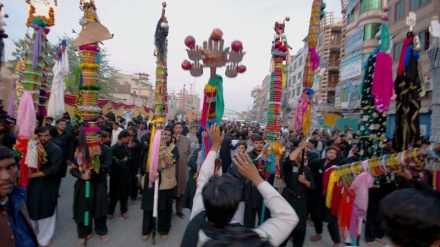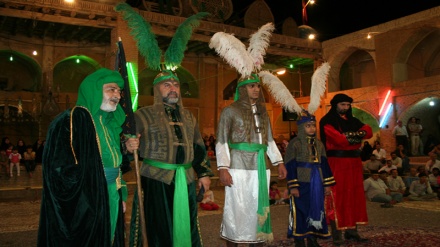Muharram mourning traditions in different lands - 9
In this series, which delves into the various mourning traditions associated with the Immortal Epic of Ashura in various lands, we look at the earliest history of mourning for Imam Husain (AS).
A famous hadith speaks of the heavenly rewards of mourning for Imam Husain (AS). As we said in our earlier episodes, the sister of the martyred Imam, Hazrat Zainab (SA), along with Imam Zain al-Abedin (AS), the son and successor of the Martyr of Karbala, laid the foundations of the mourning ceremonies of Imam Husain (AS). An integral part of the mourning assemblies is the recitation of the Ziyarat or the standard form of salutations for the Prophet’s grandson and his fellow martyrs.
There are several ziyaraat, and the most famous ones are the Ziyarat-e Ashura and Ziyarat-e Wareth. These salutations are recited at the graves of the martyrs and also from anywhere around the world. When we examine the Ziyarath-e Wareth, we can see in its words and phrases not only a testimony of the greatness of Imam Husain (AS) and the moving sentiments describing his sacrifice for the cause of Allah, but also a solemn pledge and a commitment by the reciter. One of its phrases reads:
“And I make Allah, His angels, His prophets, and His messengers, witnesses to the fact that I believe in Imam Husain and in my return to Allah. I also believe in the laws of Allah and in the consequences of human actions. I have subordinated the desires of my heart to his (Imam Husain's) heart and I sincerely submit to him and (promise to follow his commands)”
The Ziyath-e Wareth that brings tears to the eyes of the reciters is a firm testimony to the role of the Martyr of Karbala in protecting the endeavours of the prophets of the past, beginning with the Father of mankind, Adam, and including all the prominent Messengers of God, such as Noah, Abraham, Moses, Jesus, and his own grandfather, Prophet Mohammad (blessings of God upon him and his progeny). That is the reason we come across phrases in this Ziyaarah hailing Imam Husain (AS) as the Inheritor of Adam, Noah, Abraham, Moses, and Jesus (peace upon them). Another phrase reads:
“I bear witness that you established prayers, gave charity, enjoined good, forbade evil and worshipped Allah sincerely until death came to you.”
This means that if Yazid had prevailed in taking pledge of allegiance to his Godless rule from the Grandson of the Prophet of Islam, then all fundamental values of the Muslim creed would have been easily distorted and discarded. Therefore Imam Husain (AS) saved Islam and all humanitarian values by offering his lifeblood, and our tribute of tears for him are not of sorrow or frustration, but as proofs of the grief stemming from the depths of our hearts for the cruelty and brutality to which the Best of the Persons of his age. In the Ziyarath-e Ashura, which is the legacy of the Martyred Imam to us through his grandson, Imam Mohammad Baqer (AS), who was present in Karbala as a four-year old and witnessed the gruesome tragedy, we read the phrase:
“O Aba Abdullah! Unbearable is the sorrow, nerve-racking is the agony, you put up with, for us and for all the (true) Muslims; crimes committed against you also shocked and unnerved the dwellers of the heavens, one and all.”
The Imams of the Ahl al-Bayt, as we said in our last episodes, spared no efforts in promoting the culture and tradition of mourning. The 9th and 10th Imams, like their ancestors, despite living under repressive conditions. Imam Mohammad Taqi (AS) encouraged poets to compose elegies on Imam Husain (AS). During the time of Imam Ali al-Hadi (AS), the tyrannical caliph of the usurper Abbasid regime, Mutawakkil, destroyed the shrine of the Martyr of Karbala and had the area ploughed by turning the waters of the River Euphrates in the direction of the sacred grave. However, the waters, miraculously did not reach the shrine area and stayed away as if a barrier was placed between, although there was no apparent barricade. The regime officials and the onlookers were astonished. This is the reason the area is known till this day as “al-Ha’er” or the thing which is the cause of astonishment. Imam Hasan (AS) also carried on these mourning traditions, imparting to those who came into contact with him, the benefits of lamentation for Imam Husain (AS).
Then there is the famous Ziyarath-e Nahi-e Moqaddasa, from the Lord of the Age, Imam Mahdi (AS), may God hasten his reappearance and establishment of the global government of peace, prosperity and justice. He says in one of the phrases:
“Although from the aspect of time, I was not present at that time and your help was not in my destiny, so that I could fight your enemies and your opponents. Now at this time I will cry over you day and night, and instead of tears I shed blood remembering the calamities that befell you and expressing remorse over oppression that you suffered.”
From the above points we understand that the infallible Imams were involved in mourning for Imam Husain (AS) and arranged for condolence gatherings. Not only did they emphasize to the poets for recitation of poems in honour of the Martyr of Karbala, but also used to pray for them and reward them. As narrated from Imam Mahdi (AS) the mourning for Imam Husain (AS) is not only specific to him for the days of Muharram, but every morning and night he grieves, as is confirmed by the following phrases:
“Peace upon the bloodstained chests. Peace upon the parched lips. Peace upon the pallid bodies. Peace upon the gushing blood. Peace upon the dismembered
Limbs. Peace upon the heads raised upon lances. Peace upon you, O my master, and the Angels who flutter around your dome, surround your grave, circumambulate your courtyard, and come for your visitation. Salutations from the one whose heart is wounded due to the tribulations you have suffered, and whose tears flow in your remembrance.”
MD/AS/SS


